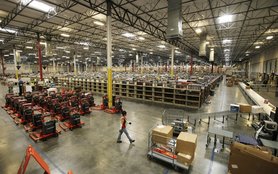Influential women call on companies and governments to protect natural resource rights
More than 200 community leaders, businesswomen and activists from around the US and the world joined international relief and development organization Oxfam America for a “Sisters on the Planet Summit” in a number of cities in the United States to mark International Women’s Day. The group is calling on companies and the US government to support the rights of women affected by oil, gas, and mining projects.
“Women are often the hardest hit by social and environmental impacts stemming from large-scale projects like oil or gas pipelines, or a gold mine,” said Nadine Kone, West Africa Regional Extractive Industries Policy Coordinator at Oxfam America in Senegal. “Loss of income and livelihoods, missing out on compensation and benefits, prostitution and trafficking, and gender-based violence are problems that often arise when mining companies fail to engage women in neighboring communities and protect their rights.”
Oxfam America is working with communities and civil society groups to push for transparency in the extractives industry, starting with following the law and implementing Section 1504 of the 2010 US Dodd-Frank Act. Oxfam America and Sisters on the Planet Ambassadors are calling on the Securities and Exchange Commission to finally implement Section 1504 and give women and communities access to payments companies make to governments for oil, gas, and mining projects. Section 1504 requires any oil, gas or mining company reporting to the SEC to disclose their payments to host governments around the world.
On the first International Women’s Day more than a century ago, one million women and men in five countries demonstrated for women’s economic, social, and political rights. Their efforts helped secure women the right to vote and make other important gains.
But women are still at risk of poverty and human rights violations around the world, particularly around oil, gas, and mining projects. Women and girls account for 6 out of 10 of the world’s poorest people, one-third of the world’s girls are married before the age of 18, reducing the years they are able to attend school, and two-thirds of the world’s illiterate people are women and girls.
There are also problems specifically related to oil, gas, and mining projects. Contaminated water and other forms of pollution from mining have major impacts on maternal health. Women and girls can be vulnerable to domestic violence, sexually transmitted diseases, and trafficking for prostitution in areas experiencing economic booms and increased migration from natural resource projects. Finally, most discussions with companies, communities, and governments do not involve women that will be affected by hydrocarbon or mining projects.
“When new oil, gas or mineral resources are discovered and developed, women are often among the groups that are excluded from the decision-making process or kept in the dark about important information,” said Ndanga Kamau, Oil and Gas Policy Adviser with Oxfam Kenya, who spoke at one of the events. “There needs to be strong policies and awareness from companies, governments, and citizens about the rights women have and how to prevent women from bearing the brunt of the negative consequences but missing out on the potential benefits. It’s time to see action from the industry and the public sector.”
Resource-rich countries often have high rates of poverty and inequality despite the massive revenues these industries generate, and women often bear the brunt of the negative impacts. To promote gender equity in communities affected by oil, gas, and mining projects, Oxfam is urging communities, governments, and companies to include women in negotiations and decision-making. Oxfam is also calling for corporate and government policies that respect women’s rights and promote gender equity; for women and girls to be included in the decision-making processes that affect their lives; and considered in all anti-poverty efforts.
“Communities impacted by extractive industry projects have a right to know how much money these projects are generating, and a right to decide how the money is used and whether projects go forward or not,” said Isabel Munilla, Senior Policy Advisor at Oxfam America. “Unfortunately, secrecy around oil and mining projects is very common in this industry and can keep women and transparency activists from holding government and companies to account for how these projects are managed and how the money is used.”
“I gathered with my fellow Sisters on the Planet Ambassadors to hear from inspiring women who are fighting for their rights around the world,” said Sister on the Planet Terie Norelli, who attended the Boston event and is President and CEO of the New Hampshire Women’s Foundation and former Speaker of the New Hampshire House of Representatives. “As a consumer I want to make sure I hold the oil, gas, and mining industry accountable for the impact they have on women in countries where they work. This International Women’s Day, I stand in solidarity with women who are defending their rights and working to right the wrong of poverty, especially in resource-rich countries.”
Oxfam America hosted International Women’s Day Summits in Seattle, Chicago, Boston and Des Moines. For more information, visit http://www.oxfamamerica.org/IWD.


